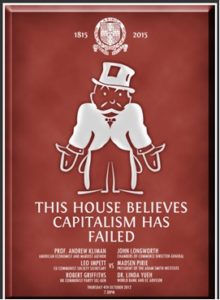On Oct. 4, the Cambridge Union Society at Cambridge University in England conducted a formal debate over the resolution: “This House believes that capitalism has failed.” The Union is a world-famous, nearly 200-year old debating society whose members are university students. That it chose this topic undoubtedly reflects the times—the economic crisis and continuing recession–which even elite institutions have to acknowledge. The economist John Maynard Keynes was a president of the Union when he was a student at Cambridge.
Members of the Society attend the debates and vote at them. The hall was filled to capacity for this debate, and hundreds more listened from other rooms. Over 500 voted at the end.
.
The entire event can be seen on YouTube at http://www.youtube.com/watch?v=EiLX68-Ywa8
Speaking in favor of the motion were (in this order) Andrew Kliman, American economist and Marxist-Humanist, Leo Impett, the Secretary of the Cambridge University Communist Society, and Robert Griffiths, the head of the Communist Party of Britain. Speakers opposing the motion were John Longworth, head the British Chambers of Commerce, Madsen Pirie, President of the Adam Smith Institute, a libertarian organization, and Linda Yueh, an economist at Oxford University and Bloomberg News commentator. Before the debate actually began, there was an additional pro-capitalism talk by a member of the Finance and Investment Club, which co-sponsored the debate.
Andrew Kliman’s presentation, which had to be truncated because he took questions during his allotted 10 minutes, can be read in full HERE
.
.
MHI conducted the following interview with Kliman to find out more about this remarkable event.
Q: How did you come to take part in a debate conducted by that august upper-crust English institution, the Cambridge Union?
A: The motion was “This House Believes that Capitalism Has Failed,” and I recently wrote a book entitled The Failure of Capitalist Production: Underlying Causes of the Great Recession, which is obviously relevant to the motion. I received an invitation to the debate and accepted it.
Q: Why did you accept when it meant facing an audience of 500 upper class English youth to defend your position?
A: The very fact that a motion like this was being debated in such a place is a sign that capitalism has failed in significant ways ever since the eruption of the economic crisis. It seems that even people who are naturally disposed to favoring capitalism are having doubts and second thoughts. In any case, I was able to speak not only to the “studio audience,” but also to the YouTube audience that can see it on their computers.
Q: Had you ever participated in a formal debate before?
A: No. I went to American public schools and colleges, and either they didn’t have debating clubs or they were no big thing, and I didn’t join them. So I had to learn all the rules. I learned just an hour before the debate that my responses to the audience’s “points of information” came out of my speaking time, so I ran out of time to finish my remarks.
Q: In your remarks, you stress that the question of whether capitalism has failed must be evaluated in terms of capitalism’s objectives. How did you show that it hasn’t succeeded on its own terms?
A: I pointed to several things: even capitalism’s proponents are conceding that it is unstable and that crises will recur. Continuing protests and disgust at the bailout of the world’s creditors show that the system is not winning people’s hearts and minds. Governments throughout the world have been brought down or almost brought down. Most importantly, the economic malaise or stagnation continues, almost five years since the recession began, and neither austerity policies instituted in many countries, nor the U.S. government’s wildly stimulative debt expansion, have brought about a strong rebound anywhere.
Q: How did you relate the motion being debated to the analysis in your book?
A: I argued that the Great Recession is really a failure of capitalism itself, not of any particular policies or institutions. I also mentioned that the government has had to bail out institutions that are “too big to fail,” and has tacitly admitted that it will continue to do so in the future. This has made capitalism even less stable than before, because now institutions and lenders have a green light to engage in even more risky behavior, knowing they will be bailed out.
Q: During the debate, the first two of the three people on the other side talked about the failures of so-called communism in the U.S.S.R., as if that proved the success of capitalism. Why do you think they did that?
A: They were clearly embarrassed by the failure of capitalism to recover from the crisis, and didn’t really want to talk about it. I was struck by how little they could say in favor of capitalism. So they interpreted the motion on the floor in a rather peculiar manner, to put it charitably. Instead of discussing whether capitalism has failed, they tried to turn it into a debate over the relative merits of capitalism and what they called “socialism.” As I pointed out during the debate, their attempt to change the issue to capitalism vs. Stalinism constitutes a logical fallacy: the “either-or” fallacy or “false dilemma.” The fact that so-called socialist systems failed doesn’t imply that Western-style capitalism hasn’t failed, nor does it imply that it’s any good.
Q: The majority of the audience voted against the motion. How do you explain that?
A: Well, I don’t think it was due to stellar argumentation by the opponents of the motion. The third speaker in opposition wasn’t crude like the others, but she was very equivocal and said she had to think a lot before deciding which side of the motion she would take! I think the vote reflected the ideological leanings and perhaps the class interests of the attendees. I was told that what was surprising was that so many people voted in favor of the motion, given the ideological orientation of the audience. Instead of a huge, lopsided vote against the motion, as was expected, the final vote was 193 in favor and 253 against, with 90 abstentions.
Q: What did you learn from this experience?
A: I learned that the issue required much more time to lay out an intellectually respectable case for either side. Also, the issues could have been clarified if there were more back and forth between the two sides, but the format of the debate was not conducive to these things. I guess what’s expected is that the speakers will make declamatory statements that are basically extended sound-bites, much in the way that politicians do.
Q: How did it feel to be treated like a person who should be turned to for a critique of capitalism by the non-left, when so much of the left ignores or denigrates your work?
A: It always feels good to be treated humanely and with common courtesy, and I’m always ready and willing to debate not only opponents on the right, but also opponents on the left. It’s a shame that there is so little direct debate on the left, and so little regard for rational argument.




Be the first to comment